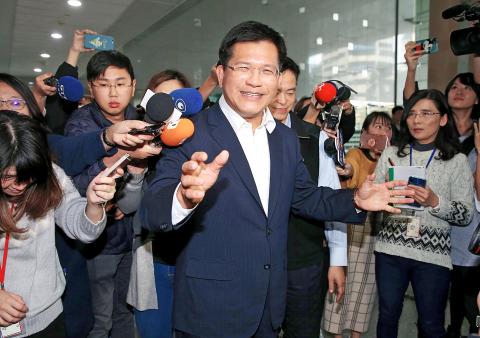Minister of Transportation and Communications Lin Chia-lung (林佳龍) yesterday said that his administration’s policies would be more down-to-earth, adding that he would take Internet users’ opinions into account.
Lin made the remarks at his first meeting with the news media after he took office in the morning.
Lin has a doctorate in political science from Yale University and was Taichung mayor before losing to Lu Shiow-yen (盧秀燕) of the Chinese Nationalist Party (KMT) in the Nov. 24 local elections. Before that, he was the head of the now-defunct Government Information Office (GIO) during former president Chen Shui-bian’s (陳水扁) administration. He also served as a lawmaker, representing a constituency in Taichung from 2012 to 2014.

Photo: CNA
Asked how he plans to lead a government agency about which he has neither academic nor professional experience, Lin said he worked closely with the Ministry of Transportation and Communications (MOTC) in his capacity as GIO head.
For example, he oversaw the establishment of the National Communications Commission, which was formed by integrating the GIO’s broadcasting affairs department with the MOTC’s Directorate-General of Telecommunications, Lin said.
He cited cooperation with the Tourism Bureau and Chunghwa Telecom — in which the MOTC has a one-third stake — on international marketing campaigns and policies related to digital convergence respectively.
As Taichung mayor, he was involved in the planning of important transportation infrastructure and services, such as the Taichung MRT System, the iBike system and an electric bus service, Lin said.
“I was a local government official before I became minister of transportation and communications, and I know how people feel. The most important thing about government policy is that it must be down-to-earth,” he said.
“The ministry should not only focus on building infrastructure, but it should also care about serving the public. Government officials should look at policies from the public’s perspective and have complementary measures in place before they implement the policies,” Lin said.
His policies would follow the principles of “safety, efficiency, quality and eco-friendliness,” he added.
Commenting on the challenges facing the Taiwan Railways Administration (TRA), Lin said that it is necessary to conduct a comprehensive review of the railway agency’s operations, but added that some of the problems cannot be solved if the ministry does not tackle their root causes.
The ministry should help the TRA address its financial issues so that the agency can offer safe, efficient and quality services, Lin said.
He would also establish a special task force to resolve disputes between the TRA management and employees, he added.
Asked about Lu’s plan to cancel the construction of a railway line to connect the TRA’s Mountain and West Coast lines, which traverse Taichung, Lin said that the project has already been approved by Executive Yuan and is under way.
Local government officials should follow due procedure if they want to express their thoughts and doubts about the project, he added.
Following his defeat in November, Lin had said that he would not seek a position in northern Taiwan.
Asked about the remark, Lin yesterday said that he is a commuter and can take the high-speed rail or drive.

A Taiwanese software developer has created a generative artificial intelligence (AI) model to help people use AI without exposing sensitive data, project head Huang Chung-hsiao (黃崇校) said yesterday. Huang, a 55-year-old coder leading a US-based team, said that concerns over data privacy and security in popular generative AIs such as ChatGPT and DeepSeek motivated him to develop a personal AI assistant named “Mei.” One of the biggest security flaws with cloud-based algorithms is that users are required to hand over personal information to access the service, giving developers the opportunity to mine user data, he said. For this reason, many government agencies and

The National Fire Agency on Thursday said a series of drills simulating a magnitude 8.5 earthquake would be held in September to enhance the government’s emergency response capabilities. Since earthquakes cannot be predicted, only by continuously promoting disaster prevention measures could Taiwan enhance its resilience to earthquakes, agency Director-General Hsiao Huan-chang (蕭煥章) said in a news release. The exercises would be held to mark annual National Disaster Prevention Day on Sept. 21, the aim of which is to test Taiwan’s preparedness and improve its earthquake resilience in case of a major temblor, Hsiao said. As part of those drills, an earthquake alert would

DEFENSE: The National Security Bureau promised to expand communication and intelligence cooperation with global partners and enhance its strategic analytical skills China has not only increased military exercises and “gray zone” tactics against Taiwan this year, but also continues to recruit military personnel for espionage, the National Security Bureau (NSB) said yesterday in a report to the Legislative Yuan. The bureau submitted the report ahead of NSB Director-General Tsai Ming-yen’s (蔡明彥) appearance before the Foreign and National Defense Committee today. Last year, the Chinese People’s Liberation Army (PLA) conducted “Joint Sword-2024A and B” military exercises targeting Taiwan and carried out 40 combat readiness patrols, the bureau said. In addition, Chinese military aircraft entered Taiwan’s airspace 3,070 times last year, up about

STRICTER ENFORCEMENT: Taipei authorities warned against drunk cycling after a sharp rise in riding under the influence, urging greater public awareness of its illegality Taipei authorities have issued a public warning urging people not to ride bicycles after consuming alcohol, following a sharp rise in riding under the influence (DUI) cases involving bicycles. Five hundred and seven people were charged with DUI last year while riding YouBikes, personal bicycles, or other self-propelled two-wheelers — a fourfold increase from the previous year, data released by the Taipei Police Department’s Traffic Division showed. Of these, 33 cases were considered severe enough to be prosecuted under “offenses against public safety,” the data showed. Under the Road Traffic Management and Penalty Act (道路交通管理處罰條例), bicycles — including YouBikes and other